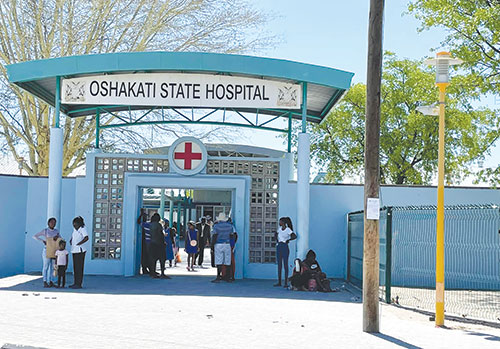Max Henrich
Victoria Kapapanda
The Oshakati Intermediate Hospital, one of the State facilities catering to a large part of the population, is faced with a serious shortage of specialist doctors and beds.
The hospital, which caters to referrals from other northern district hospitals, has only two State-employed general surgeons and
two paediatrics, with a new neonatologist,
who is responsible for thousands of people who are dependent on State hospitals, as they have no access to private medical schemes.
The second general surgeon was added about three months ago.
The ministry’s 2022 healthcare workforce status report indicates a need to fill 89 more specialist posts out of the overall 230. It shows that the State has 141 specialists on their payroll. The health ministry has a total of 19 976 staff members – and of these, 81% are government-funded, while 19% are
donor-funded.
The World Health Organisation (WHO) stipulates a minimum doctor/patient ratio of 1:1000
It takes about two to three days or more for a patient to see a doctor.
Oshakati Intermediate Hospital medical superintendent Ruben Kanime said the hospital should have at least 10 doctors for the hospital to function adequately.
“The situation is so severe that when an emergency occurs, such as a surgical procedure in the theatre, which requires about three doctors to perform, the operation is left with one doctor, who is required to single-handedly attend to hordes of patients,” he said.
Kanime also advised the public to instead visit their nearest clinic.
“Despite the long waiting list in most of our departments as a result of a shortage
of staff, equipment and limited infrastructural capacity, we take off our hats for those few specialists and medical officers, who, despite the unfavourable working shifts, always managed to save lives. All our emergencies get attended to,” he added.
The staff shortage has a detrimental effect on the public.
Selma Matias from Ehafo lyaKandenge said she has been seeking doctors’ attention for three days – just to be told to come back next February.
“I have a lump under my breast. Should I really go back home and wait for next year? she asked.
Matias fears the lump might turn into something serious.
A patient, who was in the long queue since 06h00, bemoaned the slow pace of treatment, adding that patients with serious ailments could die while waiting for medical help.
“I arrived here early in the morning with many others, but up to now none of us has seen the doctor. We were told he was coming and that we should continue waiting. Over five hours have now passed. Some people keep coming here even for days. I was referred to the hospital from a clinic,” complained the patient.
Employing qualified staff is a challenge.
“Our main issue is the difficulty in getting specialists. These are rare skills – and despite permission granted for us to recruit specialists, we managed only to have a pediatrician. We still need an internal
medicine physician, obstetrician, anaesthetist, and surgeon specialists. We are headhunting them from wherever they are, especially in Africa but they are not available or they are not interested,” said Ohangwena regional health director John Hango.
Ward 16
With growing awareness of mental health issues comes the challenge to treat those who muster the strength to seek help.
The psychiatric ward of the hospital does not have enough beds to accommodate 150 inpatients, and it lacks staff to attend to patients.
Around 16 000 to 17 000 patients per year require psychiatric help, and a total of 2 000 are inpatients who get admitted into the ward, while 14 000 to 15 000 are outpatients who require psychological evaluation, treatment and counselling.
According to specialist psychiatrist Moges Admassu, the ward receives 70 to 80 patients per day, and there are currently 64 female and 86 male patients in psychiatric ward 16.
“The ward currently only has four medical officers, four psychiatrists, 32 nurses and no social worker. We normally need eight medical officers and six psychiatrists. We use the main hospital’s only four social workers and they are barely available. We do not have any occupational therapist under our department, but the hospital has – and we do not have any psychologist in the whole hospital,” said Admassu.
The majority of the patients, according to Admassu, are psychotic, as they are schizophrenic, schizoaffective, bipolar, struggle with alcohol-related problems and some are suicidal.
“We also treat and attend to anxiety and depression outpatients,” said Admassu.
The psychiatric ward only has a few beds to accommodate the 150 inpatients, and those with no beds sleep on mattresses on the floor.
“In 2019, we requested for new beds for the ward because the ones we have are very old, falling apart and are not functional.
We still did not get those beds, and the beds we have are non-functional. After renovations, we were promised we would get new beds and the old ones would be refurbished, but until now nothing has happened,” said Admassu.
According to the hospital’s medical superintendent, Kanime, the shortage of beds in the ward is a matter of space.
“Even if we get 100 more beds, we will have nowhere to put them. Yes, we did request replacements because the beds we have are old and need to be refurbished. This financial year, we want the procurement authority to give us authority to get the beds fixed,” said Kanime.
Kanime further said, unfortunately, it is just a ward in the hospital and not a unit.
“The number of patients requiring services has increased. We made a request with the executive director of health for the psychiatric ward to be a stand-alone unit and to have our building. The request is underway,” said Kanime.
“Yes, I am aware of the shortage of medical personnel. We plan on increasing the staff. The staff establishment is old and does not respond to our current needs,” added Kanime.


